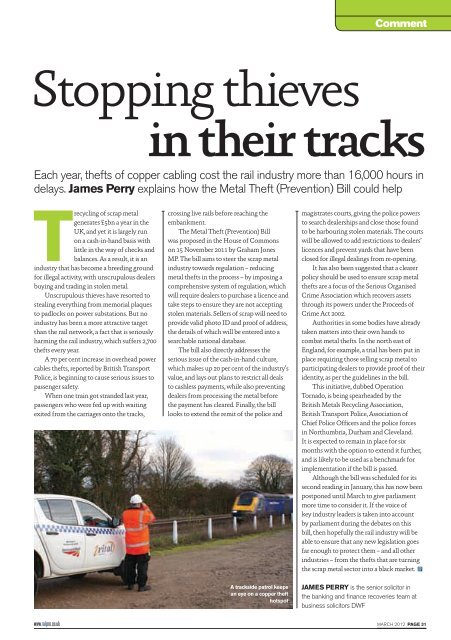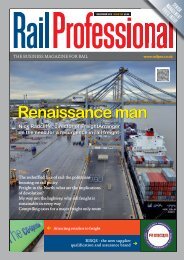View as PDF - Rail Professional
View as PDF - Rail Professional
View as PDF - Rail Professional
Create successful ePaper yourself
Turn your PDF publications into a flip-book with our unique Google optimized e-Paper software.
Comment<br />
Stopping thieves<br />
in their tracks<br />
Each year, thefts of copper cabling cost the rail industry more than 16,000 hours in<br />
delays. James Perry explains how the Metal Theft (Prevention) Bill could help<br />
Trecycling of scrap metal<br />
generates £5bn a year in the<br />
UK, and yet it is largely run<br />
on a c<strong>as</strong>h-in-hand b<strong>as</strong>is with<br />
little in the way of checks and<br />
balances. As a result, it is an<br />
industry that h<strong>as</strong> become a breeding ground<br />
for illegal activity, with unscrupulous dealers<br />
buying and trading in stolen metal.<br />
Unscrupulous thieves have resorted to<br />
stealing everything from memorial plaques<br />
to padlocks on power substations. But no<br />
industry h<strong>as</strong> been a more attractive target<br />
than the rail network, a fact that is seriously<br />
harming the rail industry, which suffers 2,700<br />
thefts every year.<br />
A 70 per cent incre<strong>as</strong>e in overhead power<br />
cables thefts, reported by British Transport<br />
Police, is beginning to cause serious issues to<br />
p<strong>as</strong>senger safety.<br />
When one train got stranded l<strong>as</strong>t year,<br />
p<strong>as</strong>sengers who were fed up with waiting<br />
exited from the carriages onto the tracks,<br />
crossing live rails before reaching the<br />
embankment.<br />
The Metal Theft (Prevention) Bill<br />
w<strong>as</strong> proposed in the House of Commons<br />
on 15 November 2011 by Graham Jones<br />
MP. The bill aims to steer the scrap metal<br />
industry towards regulation – reducing<br />
metal thefts in the process – by imposing a<br />
comprehensive system of regulation, which<br />
will require dealers to purch<strong>as</strong>e a licence and<br />
take steps to ensure they are not accepting<br />
stolen materials. Sellers of scrap will need to<br />
provide valid photo ID and proof of address,<br />
the details of which will be entered into a<br />
searchable national datab<strong>as</strong>e.<br />
The bill also directly addresses the<br />
serious issue of the c<strong>as</strong>h-in-hand culture,<br />
which makes up 20 per cent of the industry’s<br />
value, and lays out plans to restrict all deals<br />
to c<strong>as</strong>hless payments, while also preventing<br />
dealers from processing the metal before<br />
the payment h<strong>as</strong> cleared. Finally, the bill<br />
looks to extend the remit of the police and<br />
A trackside patrol keeps<br />
an eye on a copper theft<br />
hotspot<br />
magistrates courts, giving the police powers<br />
to search dealerships and close those found<br />
to be harbouring stolen materials. The courts<br />
will be allowed to add restrictions to dealers’<br />
licences and prevent yards that have been<br />
closed for illegal dealings from re-opening.<br />
It h<strong>as</strong> also been suggested that a clearer<br />
policy should be used to ensure scrap metal<br />
thefts are a focus of the Serious Organised<br />
Crime Association which recovers <strong>as</strong>sets<br />
through its powers under the Proceeds of<br />
Crime Act 2002.<br />
Authorities in some bodies have already<br />
taken matters into their own hands to<br />
combat metal thefts. In the north e<strong>as</strong>t of<br />
England, for example, a trial h<strong>as</strong> been put in<br />
place requiring those selling scrap metal to<br />
participating dealers to provide proof of their<br />
identity, <strong>as</strong> per the guidelines in the bill.<br />
This initiative, dubbed Operation<br />
Tornado, is being spearheaded by the<br />
British Metals Recycling Association,<br />
British Transport Police, Association of<br />
Chief Police Officers and the police forces<br />
in Northumbria, Durham and Cleveland.<br />
It is expected to remain in place for six<br />
months with the option to extend it further,<br />
and is likely to be used <strong>as</strong> a benchmark for<br />
implementation if the bill is p<strong>as</strong>sed.<br />
Although the bill w<strong>as</strong> scheduled for its<br />
second reading in January, this h<strong>as</strong> now been<br />
postponed until March to give parliament<br />
more time to consider it. If the voice of<br />
key industry leaders is taken into account<br />
by parliament during the debates on this<br />
bill, then hopefully the rail industry will be<br />
able to ensure that any new legislation goes<br />
far enough to protect them – and all other<br />
industries – from the thefts that are turning<br />
the scrap metal sector into a black market.<br />
James Perry is the senior solicitor in<br />
the banking and finance recoveries team at<br />
business solicitors DWF<br />
march 2012 Page 31
















